Time is an asset you can't afford to lose when you're an average homeowner. Between taking the kids to football practice and piecing together your next presentation at work, there's only so much you can do in one day. And while the weekends were once meant for R&R, today, family life is busier and more hectic than ever.

With so many tasks and responsibilities on your plate, keeping your family's cherished area rugs dust-free, germ-free, and stain-free is easier said than done. For most folks, deep-cleaning an area rug is a chore that must take a back seat to other, more important, tasks. Who wants to spend hours of cleaning area rugs after a long day at work when your kids are hungry? If you find yourself stretched thinner than a bedsheet but still want to maintain the beauty of your home's woven wool rugs, area rug cleaning in Charleston, SC, is the solution you need in your life.
Located in the beautiful state of South Carolina, Citrus Fresh Carpet & Rug Cleaning is metro Charleston's premier choice for high-end area rug cleaning. At Citrus Fresh, we understand how stressful it can be to keep up with housekeeping chores like deep cleaning your woven wool rugs. We're here to take that stress off your plate so you can focus on more important things, like cheering on your little ones at practice or picking them up from school.
Service Areas
The Citrus Fresh Area Rug Cleaning Difference
The biggest difference between Citrus Fresh and other area rug cleaners in South Carolina is that we treat your expensive area rugs like they were our own. Unlike synthetic, wall-to-wall carpets, area rugs are often handmade and require an entirely different cleaning approach than other types of carpets. Our team of highly-trained professionals understands that to a "T" and knows that, unlike other carpets, your area rugs hold sentimental value. As such, we treat your area rugs with the care and compassion they deserve.
Speaking of our team, they didn't arrive at Citrus Fresh by accident. They were vetted and chosen to be part of Citrus Fresh. In fact, we make it a point to hire team members that are courteous, friendly, and trustworthy. All our employees are tested for drugs and have their backgrounds checked as well. In addition, Citrus Fresh Carpet & Rug Cleaning Services is:
- Fully Bonded
- Fully Licensed
- Fully Insured
- Textile Pro Certified
- Dedicated to Proper Training
- A Customer-First Business with Years of Experience
Whether your area rug is a family heirloom passed down for generations or a recently-purchased treasure from the Middle East, our team has the tools and training to clean it correctly the first time out. Plus, to ensure the safety of your area rug cleaning in Charleston, SC, our passionate techs evaluate every inch of your carpet to develop a cleaning strategy. Then, using their knowledge and experience, our area rug experts follow that strategy to provide you with a highly-effective clean.
Unlike some area rug cleaning services, Citrus Fresh maintains your rug's integrity by cleaning it at our state-of-the-art facility. We'll even pick it up from your house! That way, we can clean it as thoroughly as possible and give it the attention and love it needs. Once your lovely area rug is restored to its former beauty, we'll drop it off at your home, or you can pick it up and bring it back with you to enjoy. Just let us know what works best for your schedule, and we'll cater to you.
The Citrus Fresh Carpet & Rug Cleaning Guarantee
Many area rug cleaning companies refuse to guarantee their work for one reason or another. Citrus Fresh Carpet & Rug Cleaning is not one of those companies. We offer our wonderful customers a guarantee to show them that we're dedicated to making them and every customer happy and satisfied.
If you're not fully satisfied with any service we provide, we will come back to fix the problem for free within seven days from the service date. No if's, and's, or but's. It's really that simple!
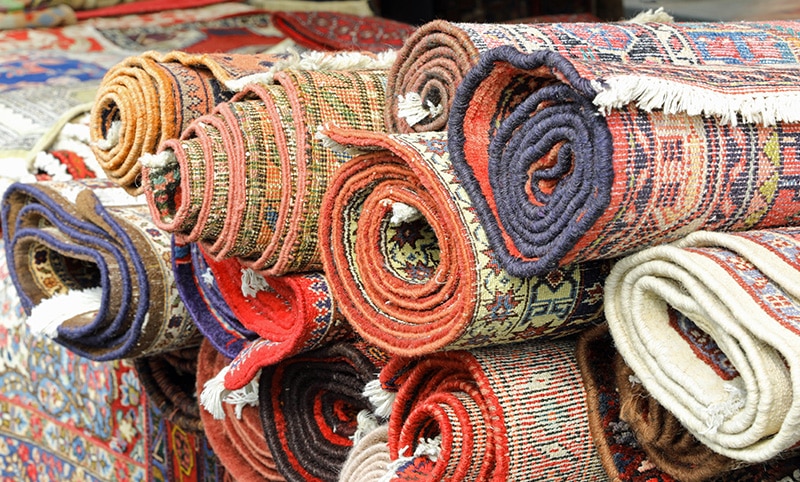
Our Process for Area Rug Cleaning in Charleston, SC
At Citrus Fresh Carpet Cleaning, we clean your valuable area rugs in our local state-of-the-art facility. For your convenience, you have the option of scheduling a pickup or delivery service. Alternatively, you can bring your area rug to us and drop it off at our cleaning location. Because every area rug we clean is a little different, no two cleaning applications will be exactly the same. However, the typical cleaning process for an area rug is as follows:
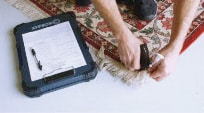
Pre-Inspection and Check In
We begin with measuring and cataloging to provide both accurate pricing and a way to track each rug throughout the cleaning process. We then thoroughly inspect the rug for fiber content, construction, dye stability and any preexisting concerns. We record this information in a detailed report with photographs. Our company will come to your home to pick up your rug, or you may drop it by our shop.


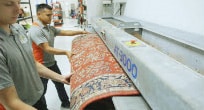
Dry Soil Removal
The vital first step to quality cleaning is dusting. Our state-of-the-art automatic rug dusting machine is specially designed to safely remove hidden embedded dust, sand and soil from the base of the face fibers. It is not unusual for a woven rug to release 2-5 lbs. of this dry material, which if not removed, can cause long term damage.
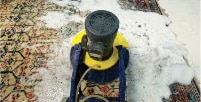
Area Rug Washing
Before the wash process has started, your rug is tested for dye stability and treated accordingly with a dye stabilizer to minimize any bleeding of the dyes. The rug is now ready to be fully washed on our clean and graded wash floor. The pre-inspection determines the appropriate techniques and products to be used for effective and safe cleaning.



Rinse & Water Removal
Once the rug has undergone its complete wash, it is time to rinse it. Using clean water and a specially designed squeegee. Followed by running the rug through one of the most successful rug-wringers in the world! Not only provides another level of rinsing, but flushes out any extra urine and other contaminants in the rug. It removes over 90% of moisture from rugs in 3 minutes or less. When the rug emerges, it is completely rinsed and merely damp.
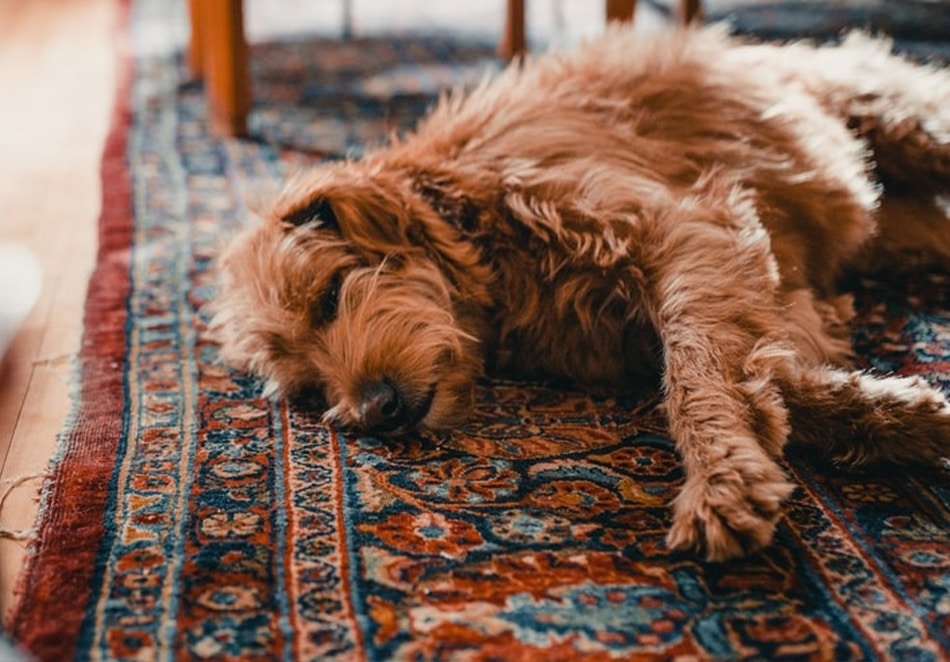
Fringe Cleaning
All fringe detail will take place in the finishing stage. Fringe will be extracted, groomed and treated accordingly.


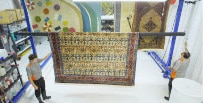
Drying
Rug are hung to finish the drying process. They are enclosed inside our dying tower rack with powerful air movers and dehumidifiers in drying each rug quickly as possible.
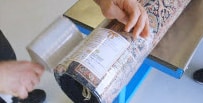
Grooming / Delivery
Once fully dried, the rug will be vacuumed and groomed. The pile will be set and it will receive a final post inspection. The rug then will be rolled, nicely wrapped and placed in our clean room to await pick-up or delivery.

Benefits of Professional Area Rug Cleaning
Whether you're on a budget or you have an abundance of free time, you may be thinking about DIY area rug cleaning in Charleston, SC. While maintaining your area rugs with regular vacuuming and spot stain removal is important, a complete area rug cleaning requires specialized knowledge, tools, and training. Here are just a few of the biggest benefits of hiring a professional area rug cleaning company like Citrus Fresh:
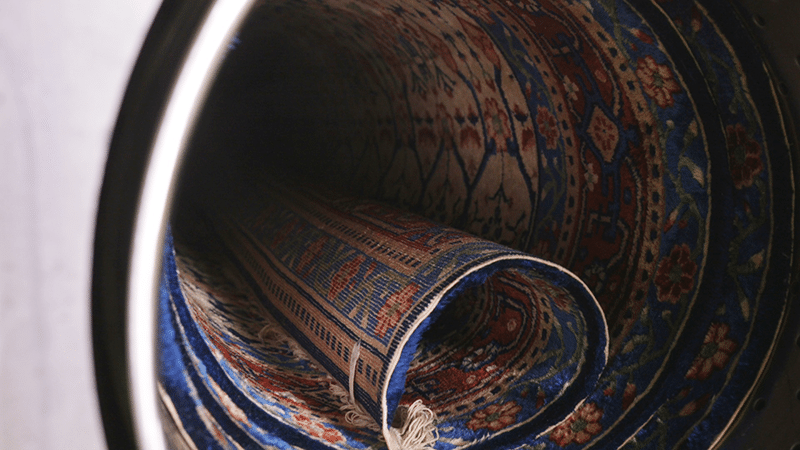
You want your rug soft to the touch
Your rug is submerged and washed with products for wool, then rinsed & spun in professional equipment!
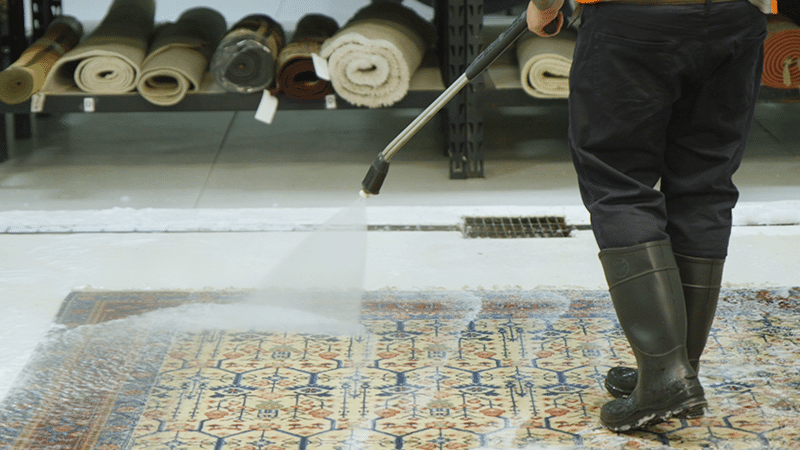
You want to see your rug colorful again
When your rug is washed correctly, you will see that pop of color that has been missing!
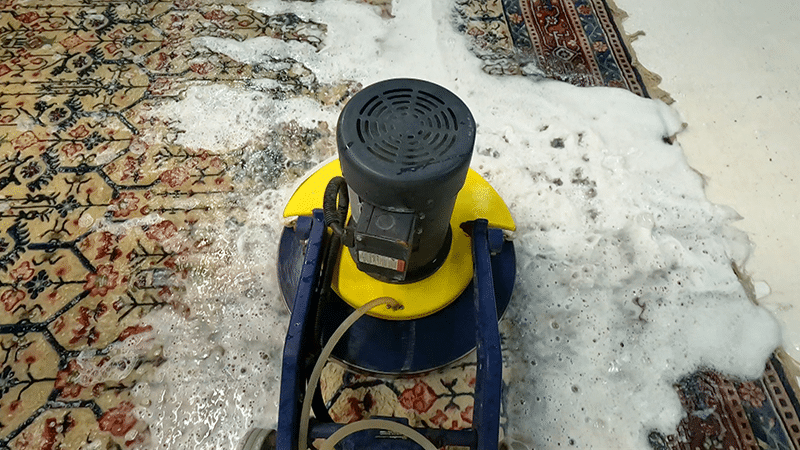
You want all pet accident odors removed
Your rug is submerged under water & flushed to give you Guaranteed Pet Odor Removal!
What About In-Home Area Rug Cleaning in Charleston, SC?
At Citrus Fresh Carpet & Rug Cleaning, we offer several carpet cleaning services to our customers. While we're happy to come to your home to clean the synthetic carpets you walk on every day, we must take a special approach with area rugs. The bottom line is that to clean your area rug properly, we must do so in our fully-equipped cleaning facility. We can't travel to your home with the equipment needed to thoroughly clean area rugs that are wool, handmade, silk, etc.
There are many reasons why an area rug must be removed from a home or office to be properly cleaned. Here are three of the most important:
Dust
Most in-home carpet cleaning does not incorporate dusting with synthetic carpets. But with area rugs, dusting is non-negotiable. Area rugs, especially of the wool variety, can hold pounds of dust, mites, dead skin, and other yucky debris. To remove this debris, dust and soil must be removed from the foundation of your rug's fibers. To do this, heavy equipment, a clean facility, and a professional's touch are needed.
Improper Rinsing
Standard in-home carpet rinsing often involves a fiber rinse that can leave residue on high-end area rugs. This residue can lead to fading and yellowing. By bringing your area rugs to our cleaning facility, our team can rinse your area rug more thoroughly. That way, we can release trapped dirt that is trapped in the wefts and warps of your Oriental rug. We can then place your area rug in our wash pit for additional rinsing, using water to flush through your rug from back to front. We then use a specialized squeegee to remove any remaining soil remnants until the water we use runs clear out of your rug.
Knowledge
Your average in-home carpet cleaner will clean your carpet the best way they can with the information they have. As such, they may treat your area rug like it is a piece of carpet. Unfortunately, that can have disastrous effects on your prized area rug.

However, highly-trained area rug specialists have unique knowledge that in-home carpet cleaners aren't required to know. As mentioned above, they also have the specific equipment and building space needed to completely clean an area rug. The owners of Citrus Fresh Carpet & Rug Cleaning were trained to clean Oriental and area rugs by world-renowned expert Lisa Wagner, earning the title "Textile Pro Certified."
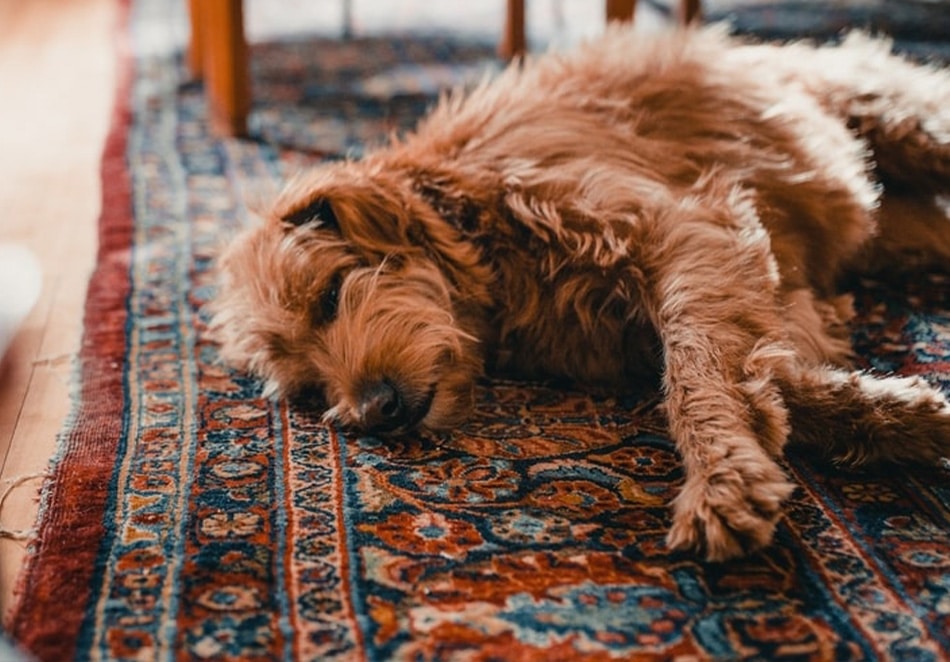
Area Rug Pads from Citrus Fresh Carpet & Rug Cleaning Services
In addition to personalized area rug cleaning in Charleston, SC, we offer custom-cut area rug pads to fit your area rugs like a glove. Our rug pads act like an insurance policy for high-quality area rugs, even if they're made of materials like wool or cotton. Unlike other rug pads, however, our pads have the ability to soak up unwanted spills.
Most rug pads allow liquids to pass right through them. When this happens, the fluid is trapped between the rug pad and your floor - an incredibly damaging circumstance for your flooring and its finish. Can you imagine what a pool of red wine would do if left to fester underneath your favorite area rug? You could be looking at thousands of dollars of damage.
With rug pads from Citrus Fresh, liquids are moved away from the rug by the absorbent top layer of the padding and are held in place by the rug pad. The pad, which is designed with a moisture barrier, does not allow the spill to reach your flooring. This innovative design doesn't just protect your floors - it protects your area rug better too. As if that weren't enough, the closed-cell technology of these pads helps provide a barrier to pet urine!
We sell Rug Pads - and will custom cut to fit your rugs!
Additional benefits of area rug pads from Citrus Fresh include:
- The Eco Preferred or Eco Value is a Green Label Certified Environmentally Safe Product
- The only "GO GREEN" felt pad on the market.
- Green Label Plus Certified
- Washable
- No Latex Rubber in Eco Products
- Sustainable Eco Friendly - 100% Recycled - 100% Recyclable
- No Odors or Off gassing
- Non-Toxic & Non-Allergenic
- Will not stain, discolor, or mark flooring.
- Great for Radiant Heat since it doesn't degrade
New Closed Cell Technology (CCT) provides a pet urine barrier. Keeps most spills & pet urine from soaking through to ruin your hardwood flooring.
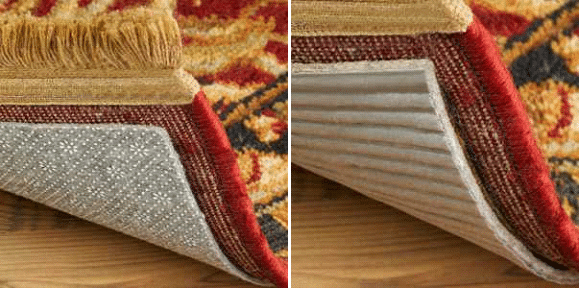
Your Top Choice for Area Rug Cleaning in Charleston, SC
You might be wondering, "Who is the best choice for area rug cleaning near me?" One look at our reviews and video testimonials, and the clear choice is Citrus Fresh Carpet & Rug Cleaning Services.
Meticulous in its cleaning and care of fine area rugs, we're proud to provide our customers with safe, reliable, efficient services that protect and restore the appearance of your rugs. Our area rug cleaning methods are incredibly potent and have been proven to clean a wide array of unique area rugs, from the most fragile family heirlooms to sturdier modern rugs.
Good old-fashioned customer service, attention to detail, and a passion for cleaning area rugs make Citrus Fresh your first choice for service and quality. Contact our office today to learn more about our cleaning process or to schedule your area rug pickup or drop-off.
Disclaimer:

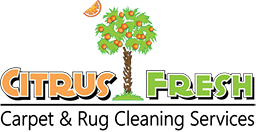

 843-566-4018
843-566-4018